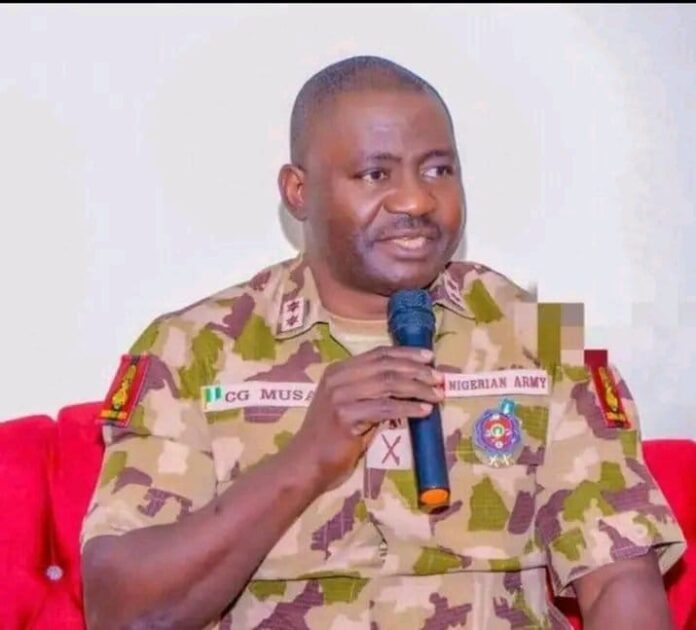The Chief of Defence Staff (CDS), General Christopher Musa, has declared that Nigeria does not need mercenaries or foreign military support to combat terrorism and insurgency within its borders. According to Musa, the solution lies in equipping the Nigerian military with modern, locally-produced weapons and armaments.
Speaking in an exclusive interview with Arise News Channel on Friday, General Musa emphasized that the Nigerian Armed Forces (AFN) are capable of handling the country’s security challenges independently, provided they are given the right tools and equipment.
“We don’t need mercenary fighters, we don’t need any foreign boots on our soil,” Musa stated firmly. “That was why it was not even being thought out. We don’t have a foreign military base in Nigeria. We have the capacity to wage the war, we are training together.”
Musa’s comments are significant, especially as Nigeria faces increasing challenges from insurgent groups like Boko Haram and the Islamic State West Africa Province (ISWAP), as well as banditry and kidnapping operations across the country. He argued that the Nigerian military has always had the ability to stabilize the West African region, citing the country’s past successes in Liberia and Sierra Leone.
“We stabilised Liberia, Sierra Leone, and other West African nations, so we can still do the same thing here,” he said, reaffirming Nigeria’s leadership role in regional peacekeeping.
General Musa pointed out that Nigeria’s military forces had already started making strides in self-sufficiency by assembling their own Armoured Personnel Carriers (APC). “I just came in from Jaji this morning, and we are now producing and assembling our own armoured personnel carrier (APC), before we start full production,” Musa revealed. “This ongoing war has helped us build the capacity to produce our own armaments.”
Musa’s focus on self-reliance in military production signals a strategic shift towards reducing dependency on foreign suppliers for essential military equipment. The production of locally made armoured vehicles and other armaments would not only boost Nigeria’s defense capabilities but also serve as a demonstration of the country’s growing military capacity.
While discussing the military’s strategic approach, General Musa acknowledged the unique challenges posed by asymmetric warfare. Traditionally trained in conventional warfare, the Nigerian military has had to adapt to the complexities of combating insurgencies, where the enemy often operates within civilian populations and exploits the rules of engagement designed to protect human rights.
“We are used to fighting countries, but now we have to deal with the enemy within, and that becomes very difficult because the enemy understands that we are subjected to human rights and other international legal instruments governing armed conflict,” he said. “This makes the situation more complicated, but we are rising to the occasion.”
The CDS also reassured Nigerians that the military remains committed to democratic governance and that no members of the Armed Forces are considering a coup. His comments were aimed at reassuring the public amidst growing concerns about the political instability in the Sahel region, where military takeovers have become more common in countries like Mali, Burkina Faso, and Niger.
“We are better in a democratic setting, so we want to sustain it,” General Musa emphasized, making it clear that the Nigerian military was firmly aligned with the country’s democratic ideals.
General Musa’s call for modern equipment is timely, as the Nigerian military has been under increasing pressure to protect citizens from terrorism and criminal activities. Nigeria’s armed forces have faced significant challenges in fighting well-armed insurgent groups, who often use guerilla tactics that are difficult to counter with conventional military methods.
The issue of adequate military equipment has been a recurring theme in the Nigerian government’s fight against terrorism. In recent years, there have been calls for the acquisition of more modern weaponry and vehicles to bolster the Nigerian Army’s operational capacity. Despite these calls, there have been criticisms of slow procurement processes, corruption, and delays in delivering promised military supplies.
In his remarks, General Musa highlighted that the military’s recent successes in assembling their own armoured vehicles demonstrate the potential for Nigeria to become more self-reliant in terms of its defense needs. The development of local armament production is seen as a critical step in reducing reliance on foreign military suppliers and ensuring that the Nigerian military is equipped with the necessary tools to defend the country’s sovereignty.
The CDS also spoke about Nigeria’s role in regional security, stressing that the country has historically played a key role in stabilizing neighboring nations. “Nigeria has always been a stabilizing force in the West African sub-region and the Sahel,” he said. “We have always stepped in to assist our neighbors in times of crisis, and we will continue to do so.”
Nigeria’s leadership in peacekeeping and its contributions to regional stability are well-documented. The Nigerian military was instrumental in the successful interventions in Liberia and Sierra Leone during their civil wars, where Nigerian peacekeepers played a pivotal role in restoring order and helping to end the conflicts.
The general’s statement also comes amid concerns that the Nigerian government may turn to foreign mercenaries for support in the fight against insurgents. This idea has been widely debated in public discourse, with some Nigerians expressing concerns over the ethical and security implications of allowing foreign forces to operate within the country. However, General Musa’s comments should put those concerns to rest, as he made it clear that Nigeria has no intention of relying on mercenaries or foreign military personnel.
As Nigeria continues its battle against terrorism, General Musa’s comments provide hope that the country’s military is on the right path toward becoming more self-sufficient and better equipped to handle security challenges. By focusing on local production of armaments and investing in modern equipment, Nigeria aims to bolster its defense capabilities and secure its borders without the need for foreign intervention.

